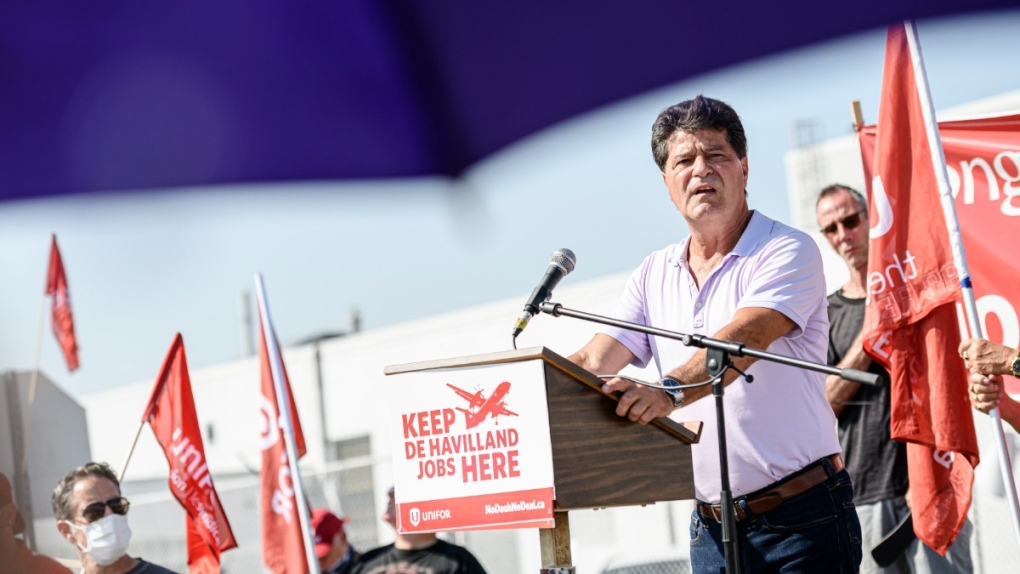TORONTO –
Canada’s largest private sector union on Wednesday claimed that its former national president Jerry Dias had received $ 50,000 from a supplier of COVID-19 Rapid test kits, which he donated to the employers of union members, some of whom purchased these test kits.
Unifor National Secretary-Treasurer Lana Payne said at a news conference Wednesday that Dias was accused of violating the code of ethics and democratic practices of the union constitution following an internal investigation.
“What you’re hearing is going to be disturbing, but I remind you all that no member is above our Constitution, not the highest ranking elected officer, no one,” Payne said. “We are all equal under that Constitution.”
She announced that Dias would now be hosted by a union executive council, as soon as April, which could lead to his Unifor membership being temporarily or permanently suspended.
The accusations leveled by Unifor inflicted damage on Dias, once her loud-mouthed and horrific leader who spoke with everyone from automakers to politicians to ensure better job security, benefits and rights for workers.
The accusations unfold as Dias was at the helm of the union, which represents about 315,000 workers, for a decade, and come as he has health problems.
The union claims that sometime before January 20, Dias received $ 50,000 from a COVID-19 test kit supplier, who refused to name Payne and did not say he was a participant in the union’s investigation because the company had no Unifor members. busy.
Payne said Dias then gave a Unifor employee what he said was half of those funds, $ 25,000, on January 20, and told the employee that it came from the provider. The employee then filed a complaint under the Unifor Code of Ethics and delivered the money to Payne.
Unifor would also not identify companies that purchased the kits or say how many purchases could be made due to Dias’ recommendations.
No other union members are involved in the investigation, she said.
Dias was informed on January 29 by an independent inquiry and began a medical leave on February 6, citing “permanent health problems”. About a month later, the union announced that he would resign, before announcing the next day that he was investigating.
In a statement released just before the union’s press conference, Dias revealed that he was entering a residential rehabilitation facility and was temporarily leaving all of his counseling positions due to his use of pain killers, sleeping pills and alcohol to deal with a sciatic nerve issue. .
“These factors have worsened my judgment in recent months, and I owe it to our members to seek the treatment I need,” he said.
“My doctor immediately told me I needed help.”
The union said Dias had been asked to take part in the investigation but had been advised by his doctor.
“I hope he gets the medical treatment he feels he needs,” Payne said.
She notes that the union has postponed an election to name Dias’ successor. Unifor Local 444 President Dave Cassidy and Scott Doherty, who served as Dias’ executive assistant, are both running.
Asked if the investigation and the upcoming hearing could lead to criminal charges, Payne said the union is seeking legal advice and fulfilling all obligations related to the incident.
“The hands are really in Unifor’s hands when it comes to taxation or not, because a lot of the information to support a complaint like that has to come from Unifor,” said Sunira Chaudhri, partner at Workly Law in Toronto.
But her accusation to the police means that Unifor can do little to disrupt the public narrative, which is important for any organization facing unrest, she added.
“If there are other cases of corruption, bribery or worse here, Unifor will not control this message,” she said.
Payne said the incident was “isolated” and based on a “probability balance” because evidence was not collected by Dias.
If Unifor were to prosecute the case criminally or in a civil trial, Chaudhri said suppliers, employers and even slides could be called in and forced to provide evidence.
“It gives you an opportunity to dig a little deeper,” she said.
While there is a risk that mistakes will be made public, these avenues would also build credibility with union members, she said.
“I do not know that they actually have the trust of the membership in the end by not pursuing it over this transaction, because as an eight-year-old president with the tenure, access and achievements he had, he has a blind eye to what might have happened otherwise. not going well.
This report from the Canadian press was first published on March 23, 2022.


Add Comment